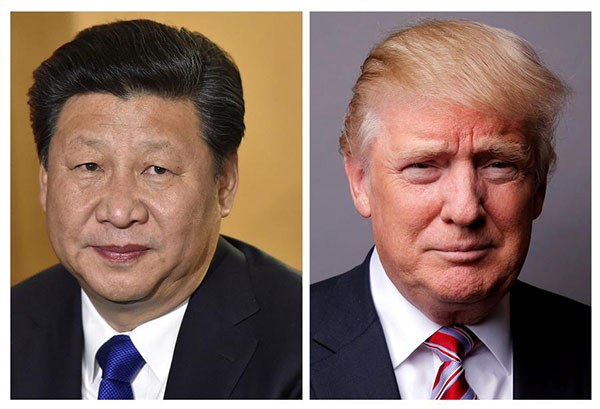
- Reuters reports that combining public bluster with behind-the-scenes diplomacy, China wrested a concession from the United States as the two presidents spoke for the first time this week, but Beijing may not be able to derive much comfort from the win on U.S. policy toward Taiwan.Several areas of disagreement between the superpowers, including currency, trade, the South China Sea and North Korea, were not mentioned in public statements on Thursday's telephone conversation between Presidents Xi Jinping and Donald Trump. In getting Trump to change course on the "one China" policy, Beijing may have overplayed its hand...Laying the foundation for that call had been the low-key engagement of China's former ambassador to Washington and top diplomat, the urbane and fluent English-speaking Yang Jiechi, with Trump's national security adviser Michael Flynn. "China was pragmatic and patient. It made every effort to smooth out the relationship, and it paid off," said Jia Qingguo, dean of the School of International Studies at Peking University, who has advised the government on foreign policy...But in its relations with Washington, the risk for Beijing remains that its diplomatic win over "one China" will be short lived, as Trump will not want to be seen as having caved in.
Financial Times writes that when Donald Trump attacked China and Japan for currency manipulation, just ten days before this weekend's summit with prime minister Shinzo Abe, it prompted immediate, vehement and largely accurate denials by East Asia's economic giants...But Japan has not intervened since 2011 and China is currently more concerned with propping up its currency than weakening it for competitive advantage. Even more frustrating for Tokyo and Beijing is that some countries in Asia clearly do manage their currencies. They are not China and Japan. Rather, the obvious culprits are Korea, Taiwan and, in some respects, Singapore. Were the US president to go after Asia's smaller currency manipulators, it could have a drastic effect on regional and global trade, particularly in industries they dominate such as semiconductors and displays. "The only ones I know that have been constantly active in trying to keep their currencies from appreciating are Korea and Taiwan," said Brad Setser, senior fellow at the Council on Foreign Relations, and a Treasury economist during the Obama administration.
- Reuters reports that the Trump administration had been expecting a North Korean "provocation" soon after taking office and will consider a full range of options in a response to Pyongyang's missile test, but calibrated to show U.S. resolve while avoiding escalation, a U.S. official told Reuters on Saturday. The new administration is also likely to step up pressure on China to rein in North Korea, reflecting President Donald Trump's previously stated view that Beijing has not done enough on this front, the official said, speaking on condition of anonymity. "This was no surprise," the official said. "The North Korean leader likes to draw attention at times like this. "Trump and his aides are likely to weigh a series of possible responses, including new U.S. sanctions to tighten financial controls, an increase in U.S. naval and air assets in and around the Korean peninsula and accelerated installation of new missile defense systems in South Korea, the official said.
- 2017-02-10 Beijing’s Patience Pays Off With Trump’s Reaffirmation of ‘One-China’ Policy
- 2017-02-09 China Praises Trump's Letter to Xi, Belated Well-Wishes
- 2017-02-08 Task force backs Trump’s tough line on China trade
- 2017-02-07 China, United States cannot afford conflict: Chinese foreign minister
- 2017-02-06 EU trade chief backs China in fight against protectionism
- 2017-02-05 Chinese Luxury Shoppers' Newest Destination: China
- 2017-02-03 U.S.-China War Over Sea Reefs Won’t Happen, Philippines Says
- 2017-02-02 Can Jim Mattis Fix Asia?
- 2017-02-01 China Manufacturing Activity in January Close to 2-Year High
- 2017-01-25 China Can Thrive in the Trump Era
- in.reuters.com China orders cities on 'pollution highway' to reduce emissions, Beijing braces for smog
- Bloomberg China's Weibo Is Now Worth More Than Twitter: Chart
- Wall Street Journal Here's One Industry Where the US Is Already Catching China—Fertilizers
- www.navytimes.com The Navy is planning fresh challenges to China's claims in the South China Sea
- qz.com Once poverty-stricken, China's "Taobao villages" have found a lifeline making trinkets for the internet
- Financial Times From cars parts to Hollywood: Chinese companies' odd evolution
- variety.com New Chinese Online Platform Makes Bold Claim of Quota-Free China Releasing (EXCLUSIVE)
- Reuters Trump administration to weigh options, press China on North Korea missile test: official
- Reuters Japan to protest to N. Korea via China over missile launch
- Reuters Big China city says many poultry markets infected with bird flu: media
- The Guardian China expels South Korean missionaries amid missile defence tensions
- The Diplomat China: The Accidental World Leader?
- Bloomberg Trump Hands Xi a Diplomatic Victory
- The Hill Sell advanced fighters to Taiwan
